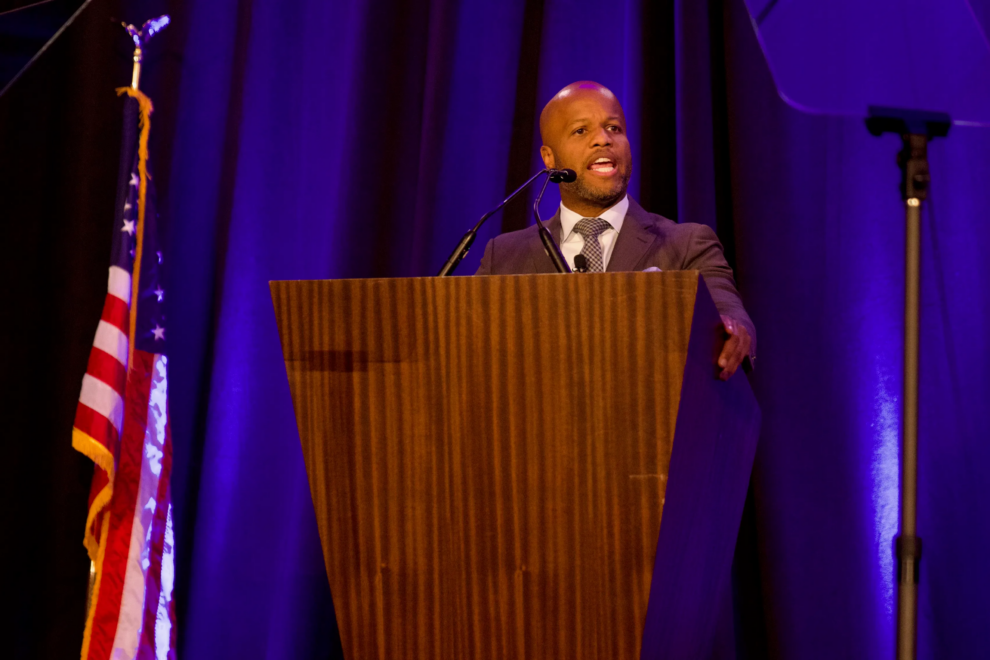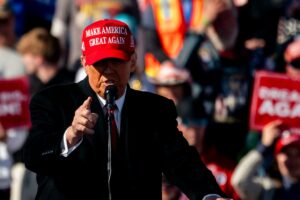Tempe Mayor Corey Woods gave his last state of the city address as a first-term mayor in front of a packed hotel ballroom where he spoke about the city’s significant successes over the past year, reflected on its shortcomings and promised to deliver on some massive initiatives in a second term.
The Friday morning event capped off what’s been a turbulent year for Tempe. Questionable contract practices have recently come to light, shortcomings at the Police Department have put at risk years of major crime cases, and Tempe leadership is under investigation by the state for possibly breaking Arizona law ― just to name a few of this year’s shake-ups.
And Woods didn’t shy away from what was perhaps 2023’s most heated and divisive issue for Tempe: the failed Arizona Coyotes election, which was unanimously supported by officials but resoundingly rejected by voters in May.
“It’s no secret that I voted for the proposed (Coyotes project). We negotiated a deal that I genuinely believed would be a win for our community,” Woods said. “Tempe voters ― our ultimate bosses ― disagreed. (And) while I personally had hoped for a different outcome, I have and always will accept the will of voters.”
Reassuring residents that Tempe’s government is responsive to their wishes was a central theme of Woods’ address as he discussed significant progress Tempe made in 2023, which he said includes a 30% reduction in homelessness over the past year and a multimillion-dollar investment in improving park safety.
Woods promised a big 2024 as well. Officials are slated to begin a $180 million effort to fix every street in Tempe, roll out a high tech public safety operations center that will allow police to track crimes in real time, and seek to overhaul the city’s layout to allow for more housing that they hope will make rents more affordable.
Here are the biggest takeaways from the mayor’s state of the city speech:
Tempe homelessness is down, resident satisfaction up
Woods touted everything from Tempe’s $22 million investment into renovating Mill Avenue, to its progress on redeveloping landmark sites such as Danelle Plaza and the Hayden Flour Mill, to the City Council securing $1.5 million for Tempe’s early childhood education program called Tempe PRE that enrolled 150 kids in 2023.
Homelessness and housing also were areas of achievement Woods honed in on as he discussed the city’s progress over the past year. Both have been core issues for him since he was elected in 2020, and Tempe has undertaken a long list of efforts designed to mitigate the problem since then.
One of those initiatives is Tempe’s CARE & HOPE line, rolled out in 2022, that residents can use to report someone experiencing homelessness in the city. Woods said the line is now averaging 100 calls a week and had helped the city get “more than 1,200 people off the street.”
Woods touched on the city’s more than $2 million investment in bringing back its park ranger program this past year. The rangers patrol local parks for disruptive behavior, which has become an increasingly pervasive issue given that record high numbers of residents report feeling unsafe in those public areas.
The mayor touted the city’s approval of 3,500 new housing units in 2023 and Woods’ own novel affordable housing initiative called Hometown for All, which is expected to add another 400 permanently affordable units in the near future.
“The most recent census of the city’s homeless population shows we’ve reduced homelessness in Tempe by 30%,” Woods said, remarking on the city’s success over the past year after explaining that tackling homelessness was a top resident concern in this year’s community survey.
By the numbers, those initiatives seemed to have a marked impact on resident satisfaction, according to the ETC Institute, a national firm that conducts surveys of cities across the country.
It found that eight out of 10 Tempe residents say they’re satisfied with city services, which is about 32% higher than the national average, according to the mayor. And among the 117 satisfaction metrics included in the survey, Tempe improved on 89 this past year, Woods said.
“The bottom line? Tempe ranks among the best cities when it comes to meeting residents’ expectations,” he said.
Woods laid out three particularly significant goals for the upcoming year: developing a new crime monitoring system, a citywide road repair initiative and a new General Plan that could transform the layout of Tempe to meet housing demands. The first effort is the only one that won’t require voter approval. The “real-time crime data center” in Tempe would use existing cameras throughout Tempe, such as traffic cameras or possibly those set up atlocal schools, to identify crimes as they happen.
It would work by streaming video feeds to screens monitored by staffers who can dispatch police or other city employees depending on the problem taking place. Mesa and Glendale have similar systems. The hope is the system will help pump the brakes on troubling public safety trends. Tempe has the region’s highest property crime rate and second highest violent crime rate, according to Valley Benchmark Communities, an initiative under ASU’s Center for Urban Innovation that includes the region’s 11 largest cities and towns.
And as it stands, two-thirds of residents worry about having their cars stolen and a one-third say they are unsatisfied with Tempe police service, 15 percentage points lower than in 2017. Woods said the real-time data center is scheduled to go online in February.
On the city infrastructure front, Woods’ most ambitious goal of 2024 will involve asking voters to approve a $180 million bond package that he said is enough to “remediate every single street in the city of Tempe over the next four years.”
“That’s a tall order. Tempe’s street network has more than 1,300 lane miles and more than 530 center-line miles. Repaving a four-lane road costs more than $1 million per mile. But we are going to get this done,” Woods said.
If voters approve the bond project in November, Tempe could make progress toward improving its road quality after it has remained stagnant for more than a decade.
A plea for civility ahead of another controversial vote in 2024
But before that effort goes to the ballot, voters will also decide the future of General Plan 2050, a potentially transformative overhaul of the city’s development blueprint that officials and staffers have spent the past two years crafting.
The plan would make it possible for developers to build taller, denser buildings further south in Tempe than was previously allowed. For officials like Woods, the plan is key to facilitate the creation of more housing units ― and therefore, to keep housing costs down by boosting supply ― in landlocked Tempe.
It’s already sparked controversy, however. Some opponents argue it’s the first in a line of dominoes that ends with the destruction on Tempe’s historically more suburban southern half, seeing it as an unwarranted expansion of the city’s urban character that’s currently concentrated along its northern tier. Woods will be the mayor to oversee that potentially heated election and likely its aftermath because he’s running for his second term unopposed. And he doesn’t want a repeat of the oftentimes vitriolic Coyotes campaign to be what christens his next four years in office.
To that end, Woods addressed pervasive divisions both locally and nationally by saying, “Never in my life have I witnessed such partisan dislike, so much anger and vitriol. We’re not totally immune to it in Tempe, but I believe we’re better than that.”
He appealed to civility based on what he described as a common goal shared by officials and residents, even if people throughout Tempe disagree on the best way to achieve it.
“We (in Tempe) argue. But we make up,” he said. “We express ourselves ― sometimes at top volume, with passion that bubbles over ― but at the end of the day, there is still something we share, an entity we value more than ourselves: Our Community. Our city.” Woods wrapped up his speech with a unifying message: “We have built a strong city. And we will make it even stronger.”
Source: Azcentral
















